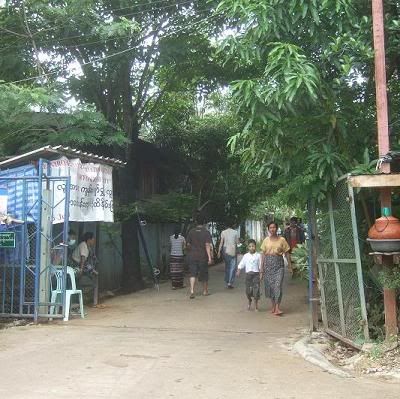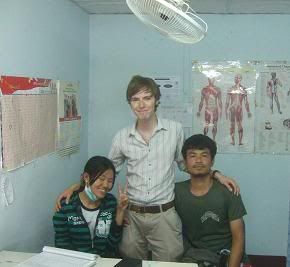This week I have moved from the Outpatient clinics to the Paediatric Inpatient ward. This is a pretty big change in pace and style and subsequently I am feeling pretty overwhelmed by it. There are 2 medical Inpatient wards at the hospital: Child (which I am on) and Adult. Between them is only one doctor, an Australian girl, who focuses most of her time on the adult ward. This means that the Paediatric ward is run by Medics at all times with the doctor only checking out complicated cases.
Last night, one of the children on our ward died. He had severe diarrhoea and severe malnutrition. I was pretty shocked by this and had a look through the log book to see if many children died here and it seemed to be about 1 in 20. Looking up I counted nearly 20 children lying on mats on the floor (no hospital beds) and wondered if they would all make it through their various illnesses.
At first, the ward seems to run pretty smoothly and after the 1st 2 days I felt pretty useless, spending my time trying to understand the treatment of
malaria and malnutrition rather than being a particularly active member of the team. Indeed on the few occasions that I tried to get involved and express my opinion, I felt like I was interfering. The medics seem to be under the impression that as I am from a different part of the world, I don't know anything about the management of the children here. Which is a fair point. I've never seen
malaria and I've never seen malnutrition but that doesn't mean I know nothing.
Yesterday a girl came in struggling for breath. Her neck was held forward and she was making a sound called "
stridor" which is the noise of the upper airway becoming obstructed. She also had a fever, couldn't eat or drink and her voice seemed somewhat muffled. To me this sounded like it could quite possibly be something called "
Epiglottitis" (This is where part of the throat becomes infected and inflamed) and this can very often get so bad that it obstructs the airway, suffocating the child. Despite being extremely rare in the UK (we are vaccinated against the bacteria responsible) it is so deadly and important that ALL medical students are taught to obey 2 golden rules if they suspect this:
Until you secured the airway through
intubation (sticking a tube down it to keep it open) you must:
1) NEVER look down the airways
2) NEVER distress the child through unecessary procedures such as trying to get intravenous access or taking an X-Ray.
I watched as both of these rules were broken (tongue depressor shoved right down her throat and intravenous access attempted 3 times) and could not help but speak up. I was ignored. This morning she was really struggling for breath. I managed to persuade the medics to check her blood oxygen levels which turned out to be swinging between low and borderline normal (84-94%) and suggested giving her oxygen. This was again ignored. Luckily the doctor turned up, gave her oxygen and referred her to the big hospital in town. Because of this, I lost any rapport I had with the head medic and spent the next few hours feeling pretty awkward and in the way.
(Just to clarify, this was not necessarily epiglottitis. In fact it probably wasn't - her tonsils were massively inflamed, as was her uvula. Whether the epiglottis was involved is unknown. However the rules should still apply)
Seeing this kind of thing is incredibly frustrating but I'm learning more and more about working in this kind of environment. You cant just turn up and expect everyone to listen to you (even if you really should be heard). You have to built relationships, gain confidence and show respect towards the local method (even if it goes against your own rules sometimes). In a week I cannot expect to really manage this. To make a true difference in this kind of setting you need to spend months, even a year (like Dr. Nicky, the Australian) working with the department. But I've made amends with the medics, having a nice long chat with Lucky (spelt Hla Khin), the boss man this afternoon and helping explain some medical conditions and English words to the junior medics. Hopefully we can spend the rest of the week working together in a productive fashion.
To finish off this rather unhappy post: This morning a child (aged 1-2 years?) with learning difficulties was abandoned by her mother at the clinic. She has moved into a side room on our ward. The saddest thing is that shes not the only one there. 3 months ago the same thing happened to a 4 year old boy with quite severe
cerebral palsy. Both have very rigid arms and legs and subsequently will probably never walk The 4 year old cannot say a single word and just stares with a rather glazed expression around the room. They've been essentially fostered by the ward and no one knows what will happen to them. The little one hates to be on her own, screaming the ward down when she is, so we all take turns playing parent unless there's too much going on, when we just shut the door...
Sorry, no pictures today, just sad stories.

 Teaching English is going well and I've even gained an assistant: Myo Myo who I worked with in my 2nd week has a great understanding of English. He's teaching me grammar (breaking down sentances into ways I neer imagined!) which I, in term, hope to teach to my class. Enough. It's 7.30pm and I'm yet to go home so I'll write more later in the week.
Teaching English is going well and I've even gained an assistant: Myo Myo who I worked with in my 2nd week has a great understanding of English. He's teaching me grammar (breaking down sentances into ways I neer imagined!) which I, in term, hope to teach to my class. Enough. It's 7.30pm and I'm yet to go home so I'll write more later in the week.


















